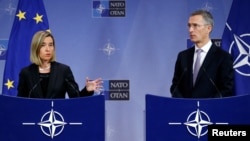NATO’s chief urged allies to maintain sanctions against Russia as foreign ministers wrapped up a two-day meeting in Brussels. The meeting also focused on European security and the upcoming Trump administration in the United States.
NATO Secretary General Jens Stoltenberg said cease-fire violations have increased massively in eastern Ukraine, with hundreds of explosions daily from military equipment banned under the Minsk cease-fire accord.
“The international community must keep pressuring Russia to respect its obligations," said Stoltenberg. "Especially while the security situation in eastern Ukraine remains so serious, it is important that economic sanctions be maintained.”
He said a four-way meeting last week between Russia, Ukraine, France and Germany did not make headway in shoring up the Minsk agreement. But he said diplomacy is the only solution.
Secretary of State John Kerry, who marked his last NATO meeting in Brussels, was holding talks later Wednesday in Germany with his Russian counterpart Sergei Lavrov, but reports suggest the key focus is the conflict in Syria.
Russia and Ukraine blame each other for lack of progress in resolving the eastern Ukraine conflict that has killed nearly 10,000 people since April 2014.
Germany’s foreign minister said he expects European sanctions against Russia to be automatically rolled over next year when they are up for renewal. But it remains unclear whether U.S. President-elect Donald Trump will take a softer line on Russia. And in France, top presidential contender Francois Fillon supports lifting the sanctions.
Alexandra de Hoop Scheffer, who heads the Paris office of the German Marshall Fund of the United States, said "everyone pretty much agrees within NATO that the relationship with Russia is probably not leading to anything positive with regards to Ukraine or Syria or Iraq."
"So there is a problem," she added, "and we have to work with that relationship, without cutting a deal with Russia or sacrificing Ukraine, to find a solution in Syria or Iraq.”
The Brussels meeting also discussed the security situation in Afghanistan and Turkey, and finalized a pact for closer military ties between NATO and the European Union. Secretary of State Kerry also sought to reassure allies that Washington’s commitment to NATO would not change under a Trump administration.




